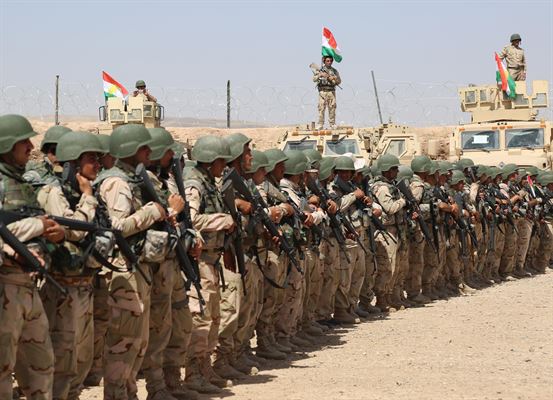WASHINGTON DC (Kurdistan 24) – Col. Ryan Dillon, Spokesman for Combined Joint Task Force—Operation Inherent Resolve (CJTF-OIR), the anti-ISIS Coalition, affirmed on Tuesday US support for cooperation between the Peshmerga and Iraqi Security Forces (ISF).
The Islamic States (IS) “will look for seams, both metaphorically and, literally, on the ground,” Dillon noted. “We saw that they [Peshmerga Forces and ISF] worked together in Mosul. We saw they worked together in Tal Afar,” Dillon said, and “we saw they worked together in Hawija.”
Iraqi Prime Minister, Haidar al-Abadi, “knows that all Iraqis require security,” including those in northern Iraq, Dillon stated, as he responded to a question from Kurdistan 24.
“So the coalition is working together with both Peshmerga and the government of Iraq, with training, with equipment, with support,” he affirmed, “in working together, so that they can identify [IS] threats” and defeat the terrorist organization.
Dillon’s comments followed the visit of Lt. Gen. Paul Funk, Commanding General of CJTF-OIR, on Tuesday to Erbil, where he met the Chancellor of the Kurdistan Region Security Council (KRSC), Masrour Barzani.
Funk’s visit capped a month-long series of visits by senior US officers to Erbil.
In their meeting, Funk and Barzani agreed “it is essential” for Peshmerga Forces and the ISF to cooperate “to fill security vacuums exploited by [IS] in disputed territories, including in Kirkuk, and to align security and military efforts with broader political reforms” to restore trust and stability and “provide for displaced families to return home,” a KRSC readout of the meeting explains.
Funk “expressed readiness to support a joint” effort between the Kurdistan Regional Government and the Federal Government to achieve those goals.
Barzani “emphasized the importance the Kurdistan Region places on close military, intelligence and security cooperation” with the US and “expressed his appreciation for payments to integrated Peshmerga brigades.”
Barzani’s meeting with Funk, which was also attended by the US Deputy Chief of Mission in Baghdad and the US Consul General in Erbil, was the fourth such meeting between Barzani and a high-ranking US Army officer over the past four weeks.
The series of meetings suggests that the US has been actively promoting collaboration between the Peshmerga and ISF since at least late March, perhaps, accompanied by quietly stepped-up security assistance to the Peshmerga.
On Mar 27, Iraqi Prime Minister Haider al-Abadi acknowledged that Baghdad’s conflict with Erbil had created a security vacuum which IS extremists had exploited.
The following day, Maj Gen. Walter Piatt, the newly appointed Commander of Coalition ground forces (known by the acronym, CJFLCC-OIR), met Barzani in Erbil, where they “discussed measures to increase coordination in the anti[IS] campaign,” according to a KRSC read-out of the meeting.
Piatt “recognized the contributions and sacrifices” of the Kurdistan Region,” although the KRSC summary says nothing about US support for the Peshmerga.
That changed two weeks later. On Apr 15, Maj. Gen. Bradley Becker, Chief of Office Security Cooperation-Iraq, traveled to Erbil to meet with Barzani.
Becker briefed the KRSC Chancellor “on future US support for integrating, reorganizing, and training programs for ISF, including Peshmerga Forces,” while the two officials “expressed concerns” over IS’ resurgence and “noted opportunities for both ISF and Peshmerga Forces to work together to combat the shared threat,” the KRSC summary of the meeting states.
On Apr 19, Piatt returned to Erbil and “discussed issues of importance to Iraqi Kurdistan-US military cooperation, particularly the anti-[IS] coalition campaign and training, equipment and support for Peshmerga Forces.”
They also “reviewed the need for Iraqi Security Forces-Peshmerga Forces coordination in disputed territories to prevent further instability.”
Five days after that, the top, overall commander of CJTF-OIR, Lt Gen. Funk, visited Erbil and met with Chancellor Barzani.
It looks like the US has come to the recognition that it needs the Peshmerga to ensure the defeat of the Islamic State, and it is has taken the appropriate steps to ensure that they are able to do so.

